Logistics Management: Challenges, Solutions and Government Involvement
VerifiedAdded on 2023/06/11
|16
|3583
|86
AI Summary
This article discusses the challenges faced by the logistics network in NSW, solutions to the problems, and government involvement in solving the situation. It covers topics such as management of workforce, network routes in Port Botany, intermodal terminal at Moorebank, and government initiatives.
Contribute Materials
Your contribution can guide someone’s learning journey. Share your
documents today.
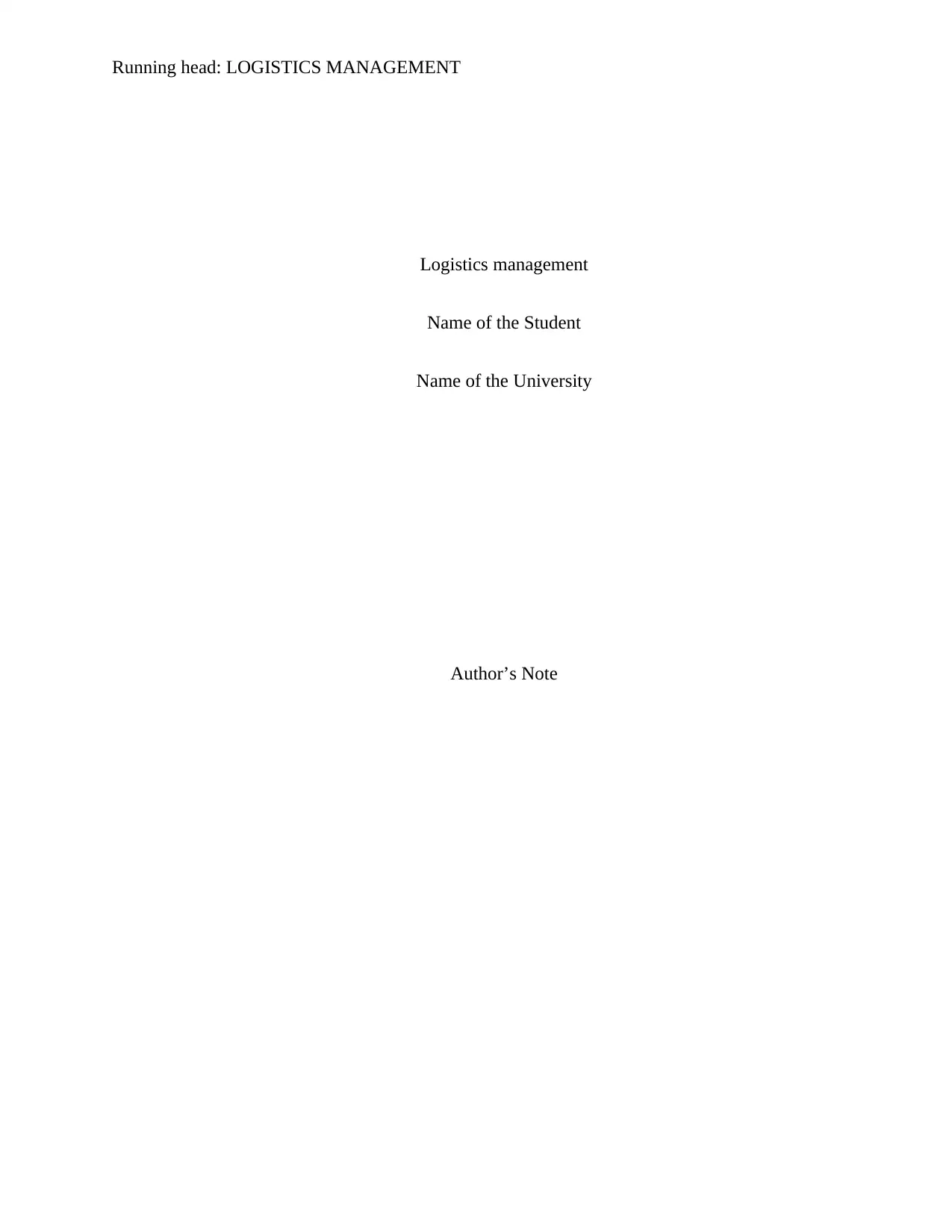
Running head: LOGISTICS MANAGEMENT
Logistics management
Name of the Student
Name of the University
Author’s Note
Logistics management
Name of the Student
Name of the University
Author’s Note
Secure Best Marks with AI Grader
Need help grading? Try our AI Grader for instant feedback on your assignments.
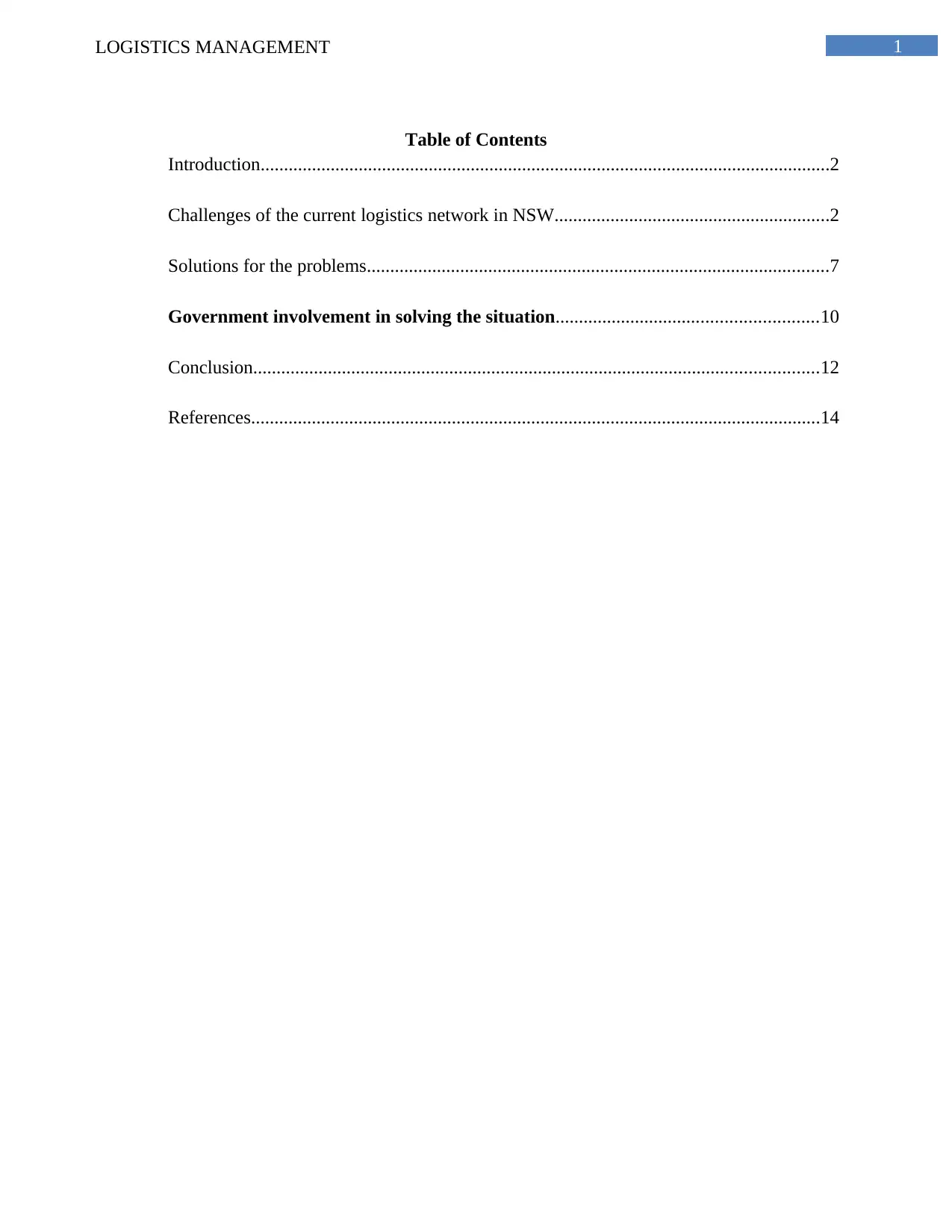
1LOGISTICS MANAGEMENT
Table of Contents
Introduction..........................................................................................................................2
Challenges of the current logistics network in NSW...........................................................2
Solutions for the problems...................................................................................................7
Government involvement in solving the situation........................................................10
Conclusion.........................................................................................................................12
References..........................................................................................................................14
Table of Contents
Introduction..........................................................................................................................2
Challenges of the current logistics network in NSW...........................................................2
Solutions for the problems...................................................................................................7
Government involvement in solving the situation........................................................10
Conclusion.........................................................................................................................12
References..........................................................................................................................14
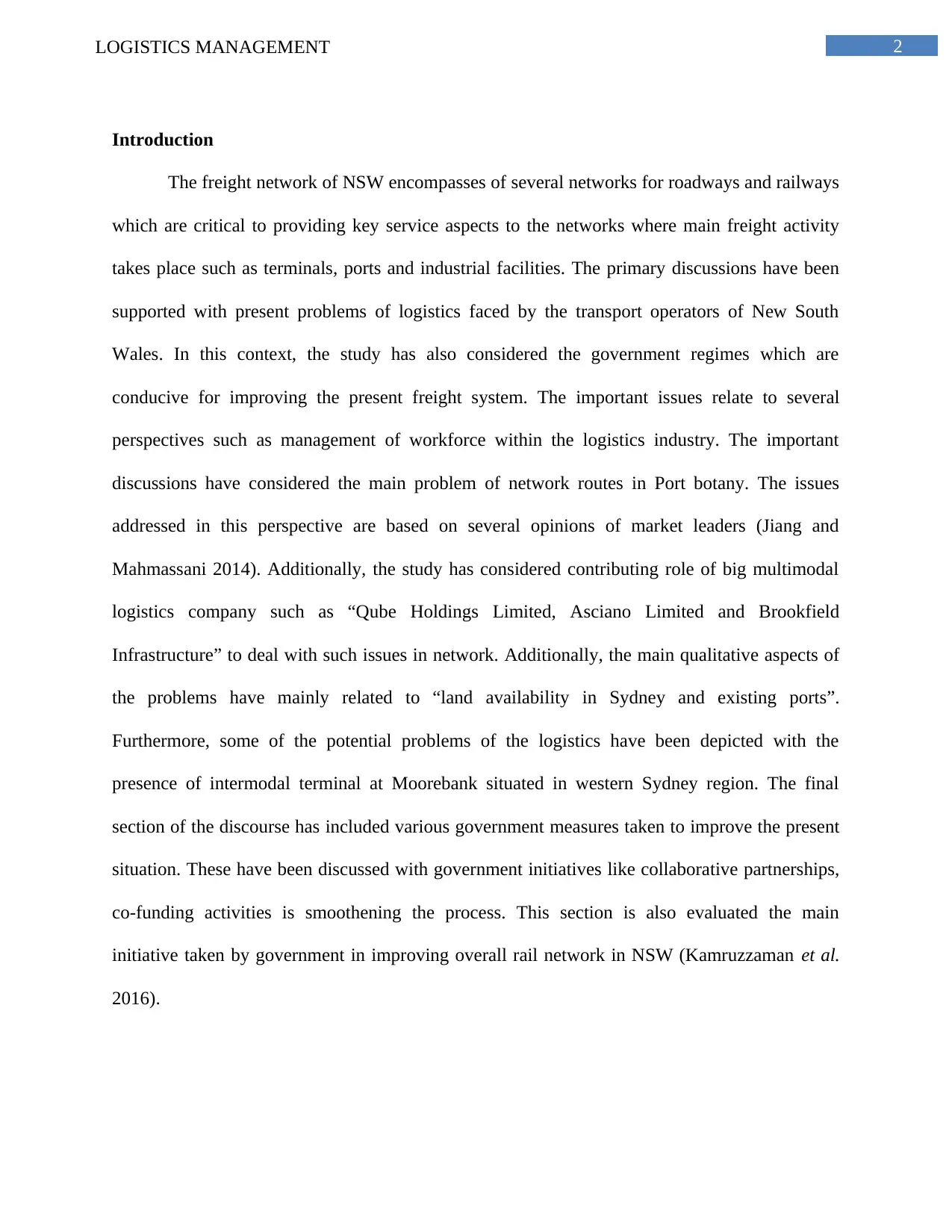
2LOGISTICS MANAGEMENT
Introduction
The freight network of NSW encompasses of several networks for roadways and railways
which are critical to providing key service aspects to the networks where main freight activity
takes place such as terminals, ports and industrial facilities. The primary discussions have been
supported with present problems of logistics faced by the transport operators of New South
Wales. In this context, the study has also considered the government regimes which are
conducive for improving the present freight system. The important issues relate to several
perspectives such as management of workforce within the logistics industry. The important
discussions have considered the main problem of network routes in Port botany. The issues
addressed in this perspective are based on several opinions of market leaders (Jiang and
Mahmassani 2014). Additionally, the study has considered contributing role of big multimodal
logistics company such as “Qube Holdings Limited, Asciano Limited and Brookfield
Infrastructure” to deal with such issues in network. Additionally, the main qualitative aspects of
the problems have mainly related to “land availability in Sydney and existing ports”.
Furthermore, some of the potential problems of the logistics have been depicted with the
presence of intermodal terminal at Moorebank situated in western Sydney region. The final
section of the discourse has included various government measures taken to improve the present
situation. These have been discussed with government initiatives like collaborative partnerships,
co-funding activities is smoothening the process. This section is also evaluated the main
initiative taken by government in improving overall rail network in NSW (Kamruzzaman et al.
2016).
Introduction
The freight network of NSW encompasses of several networks for roadways and railways
which are critical to providing key service aspects to the networks where main freight activity
takes place such as terminals, ports and industrial facilities. The primary discussions have been
supported with present problems of logistics faced by the transport operators of New South
Wales. In this context, the study has also considered the government regimes which are
conducive for improving the present freight system. The important issues relate to several
perspectives such as management of workforce within the logistics industry. The important
discussions have considered the main problem of network routes in Port botany. The issues
addressed in this perspective are based on several opinions of market leaders (Jiang and
Mahmassani 2014). Additionally, the study has considered contributing role of big multimodal
logistics company such as “Qube Holdings Limited, Asciano Limited and Brookfield
Infrastructure” to deal with such issues in network. Additionally, the main qualitative aspects of
the problems have mainly related to “land availability in Sydney and existing ports”.
Furthermore, some of the potential problems of the logistics have been depicted with the
presence of intermodal terminal at Moorebank situated in western Sydney region. The final
section of the discourse has included various government measures taken to improve the present
situation. These have been discussed with government initiatives like collaborative partnerships,
co-funding activities is smoothening the process. This section is also evaluated the main
initiative taken by government in improving overall rail network in NSW (Kamruzzaman et al.
2016).
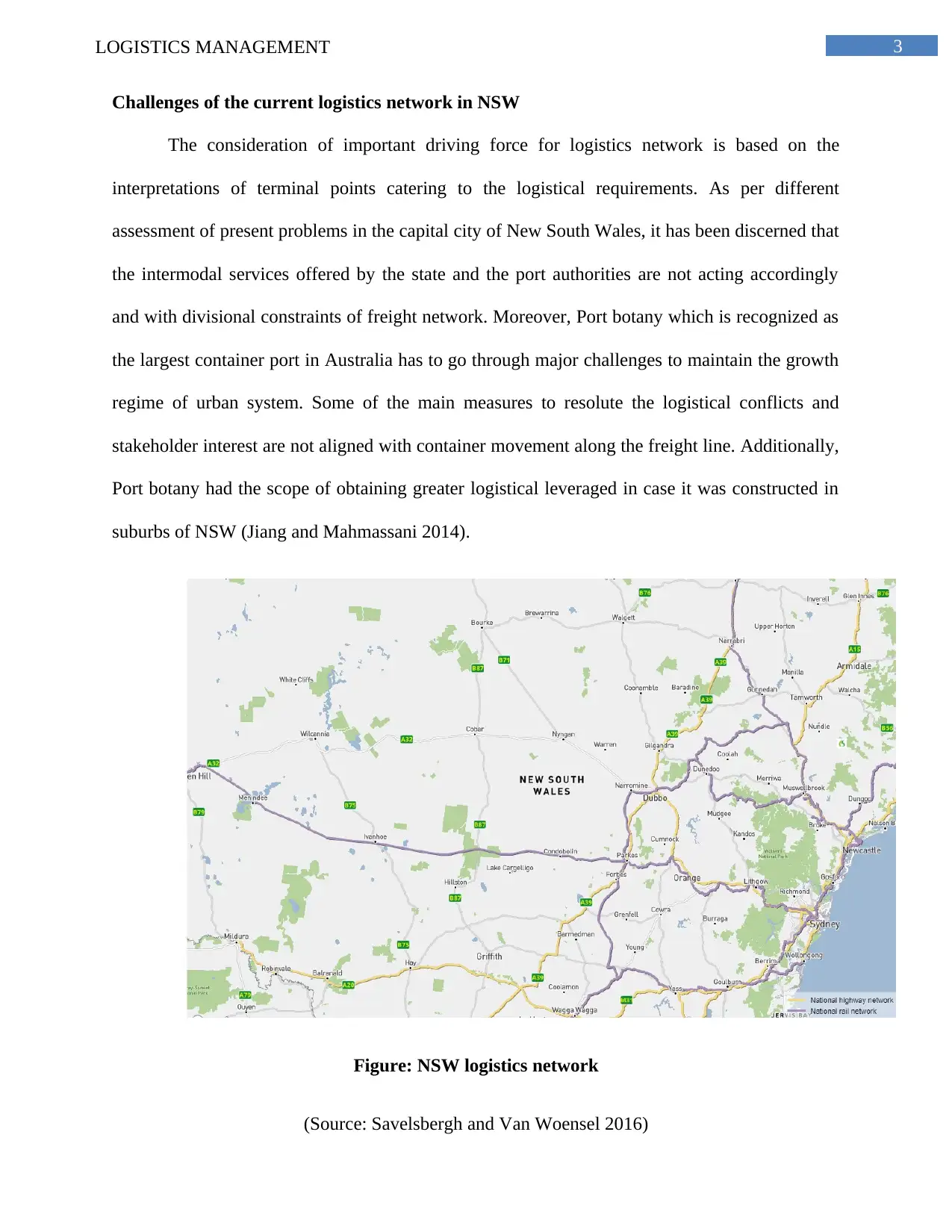
3LOGISTICS MANAGEMENT
Challenges of the current logistics network in NSW
The consideration of important driving force for logistics network is based on the
interpretations of terminal points catering to the logistical requirements. As per different
assessment of present problems in the capital city of New South Wales, it has been discerned that
the intermodal services offered by the state and the port authorities are not acting accordingly
and with divisional constraints of freight network. Moreover, Port botany which is recognized as
the largest container port in Australia has to go through major challenges to maintain the growth
regime of urban system. Some of the main measures to resolute the logistical conflicts and
stakeholder interest are not aligned with container movement along the freight line. Additionally,
Port botany had the scope of obtaining greater logistical leveraged in case it was constructed in
suburbs of NSW (Jiang and Mahmassani 2014).
Figure: NSW logistics network
(Source: Savelsbergh and Van Woensel 2016)
Challenges of the current logistics network in NSW
The consideration of important driving force for logistics network is based on the
interpretations of terminal points catering to the logistical requirements. As per different
assessment of present problems in the capital city of New South Wales, it has been discerned that
the intermodal services offered by the state and the port authorities are not acting accordingly
and with divisional constraints of freight network. Moreover, Port botany which is recognized as
the largest container port in Australia has to go through major challenges to maintain the growth
regime of urban system. Some of the main measures to resolute the logistical conflicts and
stakeholder interest are not aligned with container movement along the freight line. Additionally,
Port botany had the scope of obtaining greater logistical leveraged in case it was constructed in
suburbs of NSW (Jiang and Mahmassani 2014).
Figure: NSW logistics network
(Source: Savelsbergh and Van Woensel 2016)
Secure Best Marks with AI Grader
Need help grading? Try our AI Grader for instant feedback on your assignments.
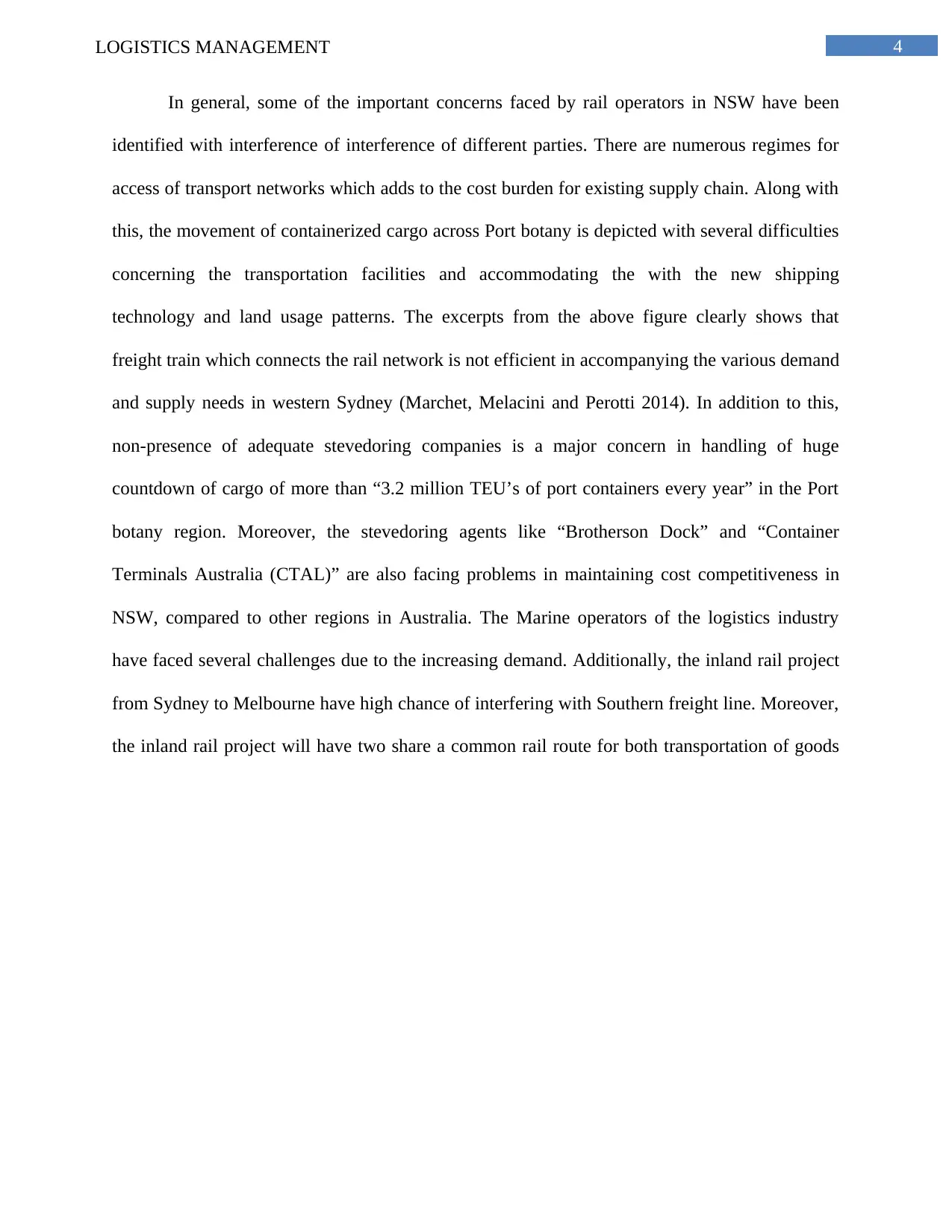
4LOGISTICS MANAGEMENT
In general, some of the important concerns faced by rail operators in NSW have been
identified with interference of interference of different parties. There are numerous regimes for
access of transport networks which adds to the cost burden for existing supply chain. Along with
this, the movement of containerized cargo across Port botany is depicted with several difficulties
concerning the transportation facilities and accommodating the with the new shipping
technology and land usage patterns. The excerpts from the above figure clearly shows that
freight train which connects the rail network is not efficient in accompanying the various demand
and supply needs in western Sydney (Marchet, Melacini and Perotti 2014). In addition to this,
non-presence of adequate stevedoring companies is a major concern in handling of huge
countdown of cargo of more than “3.2 million TEU’s of port containers every year” in the Port
botany region. Moreover, the stevedoring agents like “Brotherson Dock” and “Container
Terminals Australia (CTAL)” are also facing problems in maintaining cost competitiveness in
NSW, compared to other regions in Australia. The Marine operators of the logistics industry
have faced several challenges due to the increasing demand. Additionally, the inland rail project
from Sydney to Melbourne have high chance of interfering with Southern freight line. Moreover,
the inland rail project will have two share a common rail route for both transportation of goods
In general, some of the important concerns faced by rail operators in NSW have been
identified with interference of interference of different parties. There are numerous regimes for
access of transport networks which adds to the cost burden for existing supply chain. Along with
this, the movement of containerized cargo across Port botany is depicted with several difficulties
concerning the transportation facilities and accommodating the with the new shipping
technology and land usage patterns. The excerpts from the above figure clearly shows that
freight train which connects the rail network is not efficient in accompanying the various demand
and supply needs in western Sydney (Marchet, Melacini and Perotti 2014). In addition to this,
non-presence of adequate stevedoring companies is a major concern in handling of huge
countdown of cargo of more than “3.2 million TEU’s of port containers every year” in the Port
botany region. Moreover, the stevedoring agents like “Brotherson Dock” and “Container
Terminals Australia (CTAL)” are also facing problems in maintaining cost competitiveness in
NSW, compared to other regions in Australia. The Marine operators of the logistics industry
have faced several challenges due to the increasing demand. Additionally, the inland rail project
from Sydney to Melbourne have high chance of interfering with Southern freight line. Moreover,
the inland rail project will have two share a common rail route for both transportation of goods
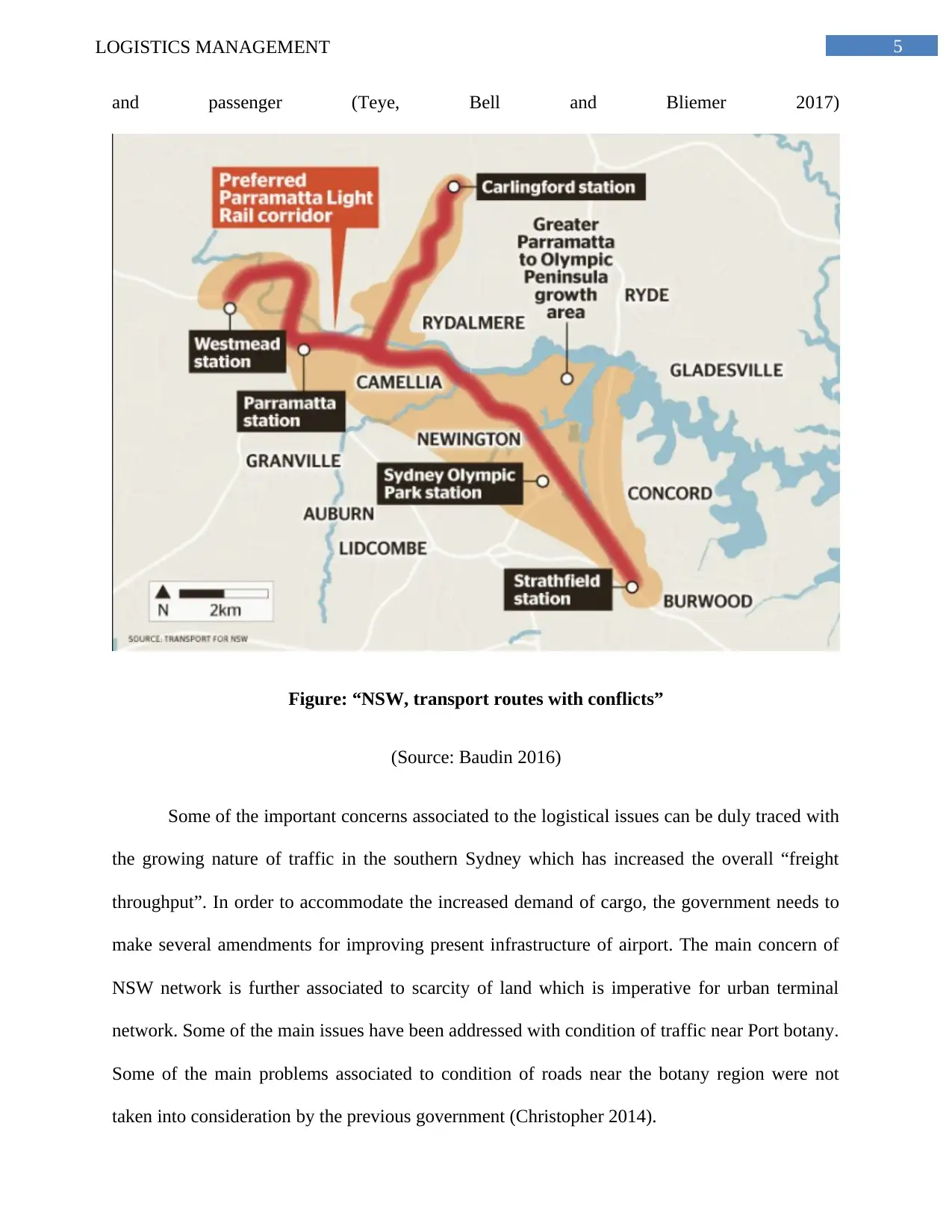
5LOGISTICS MANAGEMENT
and passenger (Teye, Bell and Bliemer 2017)
Figure: “NSW, transport routes with conflicts”
(Source: Baudin 2016)
Some of the important concerns associated to the logistical issues can be duly traced with
the growing nature of traffic in the southern Sydney which has increased the overall “freight
throughput”. In order to accommodate the increased demand of cargo, the government needs to
make several amendments for improving present infrastructure of airport. The main concern of
NSW network is further associated to scarcity of land which is imperative for urban terminal
network. Some of the main issues have been addressed with condition of traffic near Port botany.
Some of the main problems associated to condition of roads near the botany region were not
taken into consideration by the previous government (Christopher 2014).
and passenger (Teye, Bell and Bliemer 2017)
Figure: “NSW, transport routes with conflicts”
(Source: Baudin 2016)
Some of the important concerns associated to the logistical issues can be duly traced with
the growing nature of traffic in the southern Sydney which has increased the overall “freight
throughput”. In order to accommodate the increased demand of cargo, the government needs to
make several amendments for improving present infrastructure of airport. The main concern of
NSW network is further associated to scarcity of land which is imperative for urban terminal
network. Some of the main issues have been addressed with condition of traffic near Port botany.
Some of the main problems associated to condition of roads near the botany region were not
taken into consideration by the previous government (Christopher 2014).
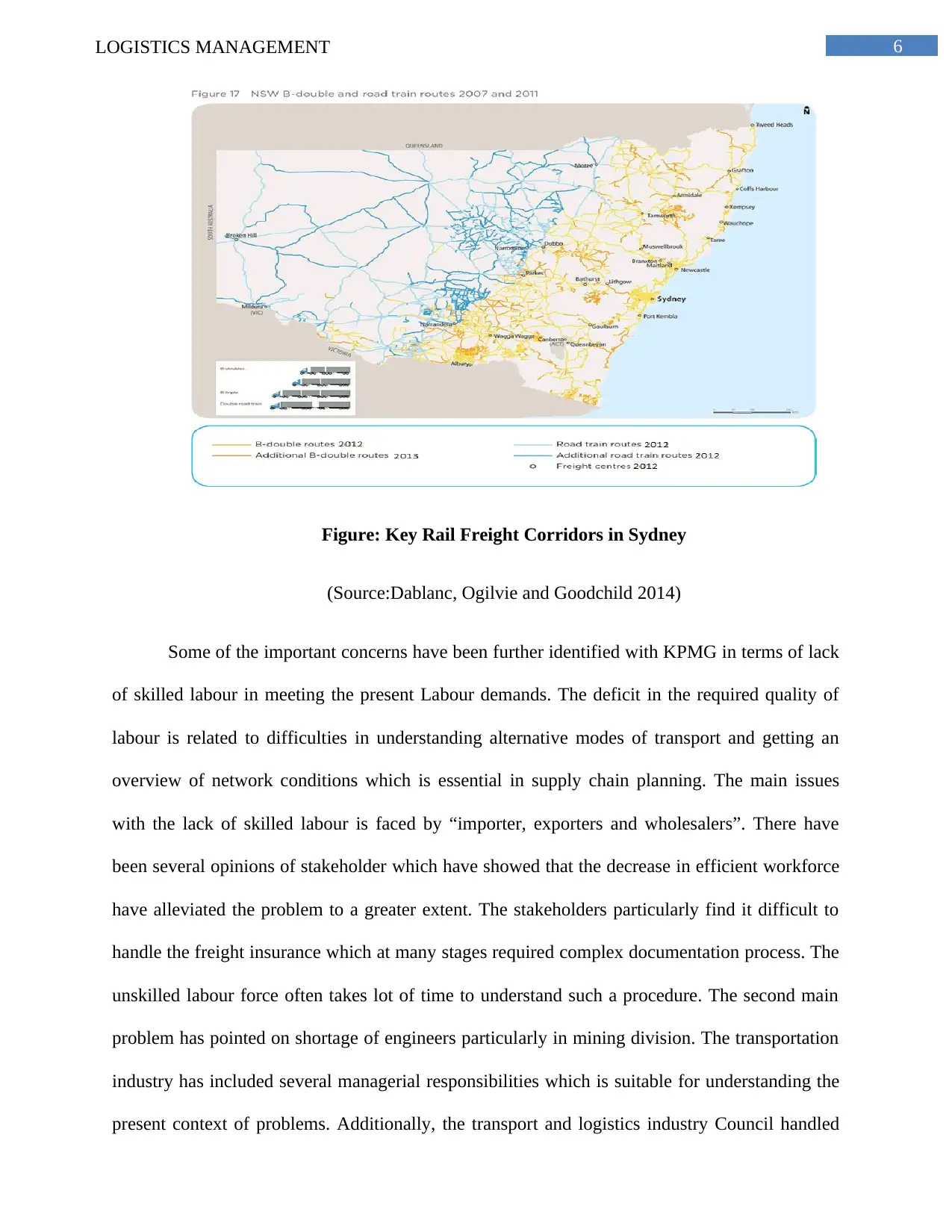
6LOGISTICS MANAGEMENT
Figure: Key Rail Freight Corridors in Sydney
(Source:Dablanc, Ogilvie and Goodchild 2014)
Some of the important concerns have been further identified with KPMG in terms of lack
of skilled labour in meeting the present Labour demands. The deficit in the required quality of
labour is related to difficulties in understanding alternative modes of transport and getting an
overview of network conditions which is essential in supply chain planning. The main issues
with the lack of skilled labour is faced by “importer, exporters and wholesalers”. There have
been several opinions of stakeholder which have showed that the decrease in efficient workforce
have alleviated the problem to a greater extent. The stakeholders particularly find it difficult to
handle the freight insurance which at many stages required complex documentation process. The
unskilled labour force often takes lot of time to understand such a procedure. The second main
problem has pointed on shortage of engineers particularly in mining division. The transportation
industry has included several managerial responsibilities which is suitable for understanding the
present context of problems. Additionally, the transport and logistics industry Council handled
Figure: Key Rail Freight Corridors in Sydney
(Source:Dablanc, Ogilvie and Goodchild 2014)
Some of the important concerns have been further identified with KPMG in terms of lack
of skilled labour in meeting the present Labour demands. The deficit in the required quality of
labour is related to difficulties in understanding alternative modes of transport and getting an
overview of network conditions which is essential in supply chain planning. The main issues
with the lack of skilled labour is faced by “importer, exporters and wholesalers”. There have
been several opinions of stakeholder which have showed that the decrease in efficient workforce
have alleviated the problem to a greater extent. The stakeholders particularly find it difficult to
handle the freight insurance which at many stages required complex documentation process. The
unskilled labour force often takes lot of time to understand such a procedure. The second main
problem has pointed on shortage of engineers particularly in mining division. The transportation
industry has included several managerial responsibilities which is suitable for understanding the
present context of problems. Additionally, the transport and logistics industry Council handled
Paraphrase This Document
Need a fresh take? Get an instant paraphrase of this document with our AI Paraphraser
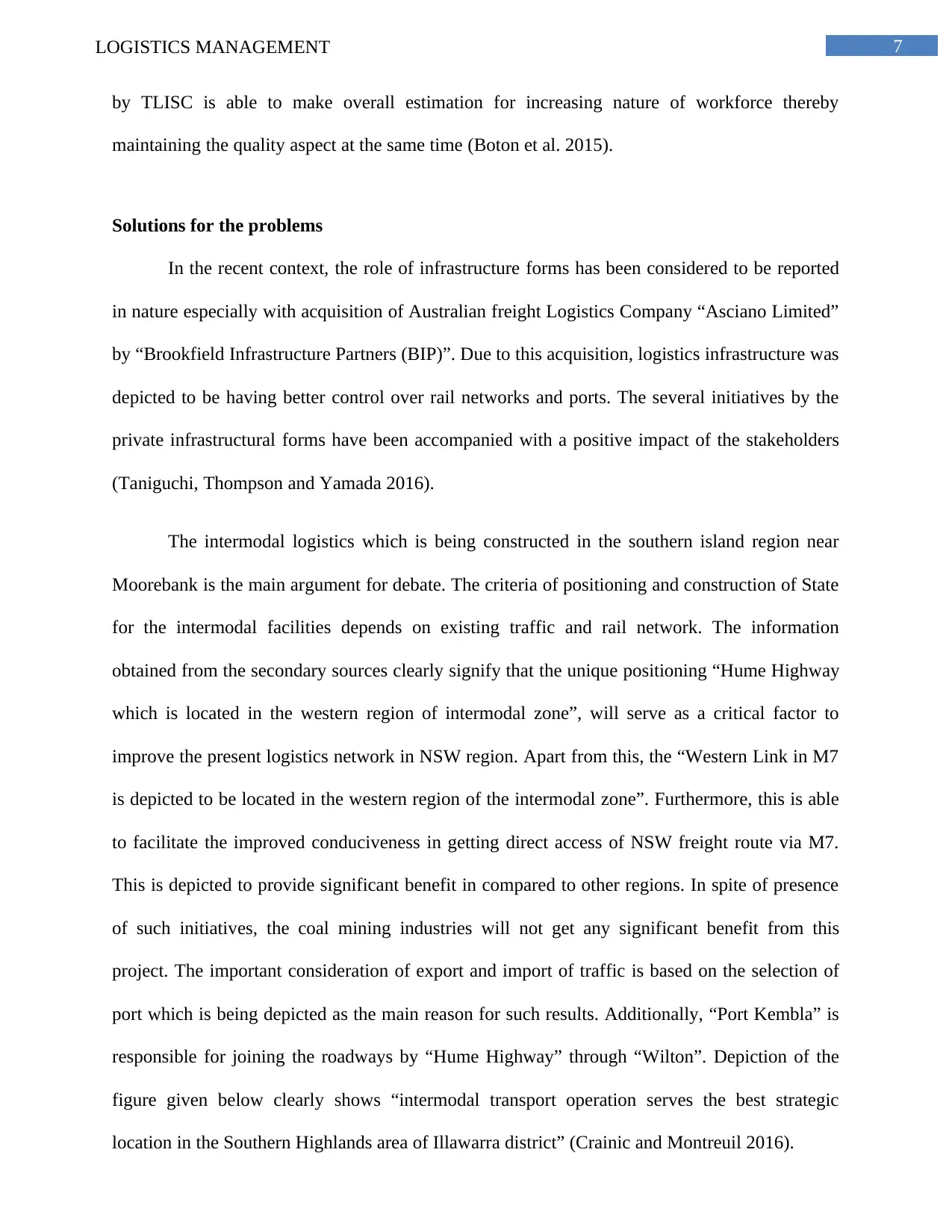
7LOGISTICS MANAGEMENT
by TLISC is able to make overall estimation for increasing nature of workforce thereby
maintaining the quality aspect at the same time (Boton et al. 2015).
Solutions for the problems
In the recent context, the role of infrastructure forms has been considered to be reported
in nature especially with acquisition of Australian freight Logistics Company “Asciano Limited”
by “Brookfield Infrastructure Partners (BIP)”. Due to this acquisition, logistics infrastructure was
depicted to be having better control over rail networks and ports. The several initiatives by the
private infrastructural forms have been accompanied with a positive impact of the stakeholders
(Taniguchi, Thompson and Yamada 2016).
The intermodal logistics which is being constructed in the southern island region near
Moorebank is the main argument for debate. The criteria of positioning and construction of State
for the intermodal facilities depends on existing traffic and rail network. The information
obtained from the secondary sources clearly signify that the unique positioning “Hume Highway
which is located in the western region of intermodal zone”, will serve as a critical factor to
improve the present logistics network in NSW region. Apart from this, the “Western Link in M7
is depicted to be located in the western region of the intermodal zone”. Furthermore, this is able
to facilitate the improved conduciveness in getting direct access of NSW freight route via M7.
This is depicted to provide significant benefit in compared to other regions. In spite of presence
of such initiatives, the coal mining industries will not get any significant benefit from this
project. The important consideration of export and import of traffic is based on the selection of
port which is being depicted as the main reason for such results. Additionally, “Port Kembla” is
responsible for joining the roadways by “Hume Highway” through “Wilton”. Depiction of the
figure given below clearly shows “intermodal transport operation serves the best strategic
location in the Southern Highlands area of Illawarra district” (Crainic and Montreuil 2016).
by TLISC is able to make overall estimation for increasing nature of workforce thereby
maintaining the quality aspect at the same time (Boton et al. 2015).
Solutions for the problems
In the recent context, the role of infrastructure forms has been considered to be reported
in nature especially with acquisition of Australian freight Logistics Company “Asciano Limited”
by “Brookfield Infrastructure Partners (BIP)”. Due to this acquisition, logistics infrastructure was
depicted to be having better control over rail networks and ports. The several initiatives by the
private infrastructural forms have been accompanied with a positive impact of the stakeholders
(Taniguchi, Thompson and Yamada 2016).
The intermodal logistics which is being constructed in the southern island region near
Moorebank is the main argument for debate. The criteria of positioning and construction of State
for the intermodal facilities depends on existing traffic and rail network. The information
obtained from the secondary sources clearly signify that the unique positioning “Hume Highway
which is located in the western region of intermodal zone”, will serve as a critical factor to
improve the present logistics network in NSW region. Apart from this, the “Western Link in M7
is depicted to be located in the western region of the intermodal zone”. Furthermore, this is able
to facilitate the improved conduciveness in getting direct access of NSW freight route via M7.
This is depicted to provide significant benefit in compared to other regions. In spite of presence
of such initiatives, the coal mining industries will not get any significant benefit from this
project. The important consideration of export and import of traffic is based on the selection of
port which is being depicted as the main reason for such results. Additionally, “Port Kembla” is
responsible for joining the roadways by “Hume Highway” through “Wilton”. Depiction of the
figure given below clearly shows “intermodal transport operation serves the best strategic
location in the Southern Highlands area of Illawarra district” (Crainic and Montreuil 2016).
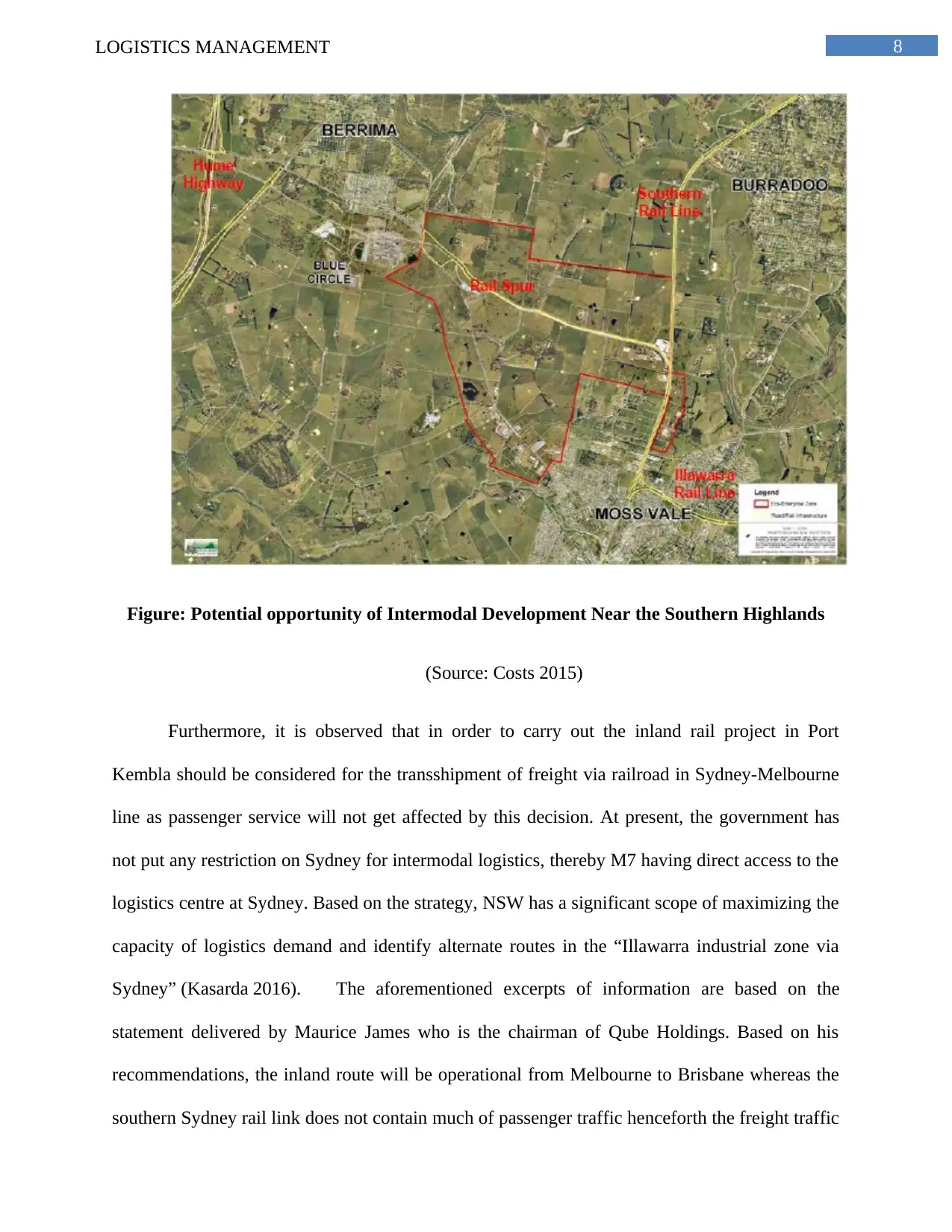
8LOGISTICS MANAGEMENT
Figure: Potential opportunity of Intermodal Development Near the Southern Highlands
(Source: Costs 2015)
Furthermore, it is observed that in order to carry out the inland rail project in Port
Kembla should be considered for the transshipment of freight via railroad in Sydney-Melbourne
line as passenger service will not get affected by this decision. At present, the government has
not put any restriction on Sydney for intermodal logistics, thereby M7 having direct access to the
logistics centre at Sydney. Based on the strategy, NSW has a significant scope of maximizing the
capacity of logistics demand and identify alternate routes in the “Illawarra industrial zone via
Sydney” (Kasarda 2016). The aforementioned excerpts of information are based on the
statement delivered by Maurice James who is the chairman of Qube Holdings. Based on his
recommendations, the inland route will be operational from Melbourne to Brisbane whereas the
southern Sydney rail link does not contain much of passenger traffic henceforth the freight traffic
Figure: Potential opportunity of Intermodal Development Near the Southern Highlands
(Source: Costs 2015)
Furthermore, it is observed that in order to carry out the inland rail project in Port
Kembla should be considered for the transshipment of freight via railroad in Sydney-Melbourne
line as passenger service will not get affected by this decision. At present, the government has
not put any restriction on Sydney for intermodal logistics, thereby M7 having direct access to the
logistics centre at Sydney. Based on the strategy, NSW has a significant scope of maximizing the
capacity of logistics demand and identify alternate routes in the “Illawarra industrial zone via
Sydney” (Kasarda 2016). The aforementioned excerpts of information are based on the
statement delivered by Maurice James who is the chairman of Qube Holdings. Based on his
recommendations, the inland route will be operational from Melbourne to Brisbane whereas the
southern Sydney rail link does not contain much of passenger traffic henceforth the freight traffic
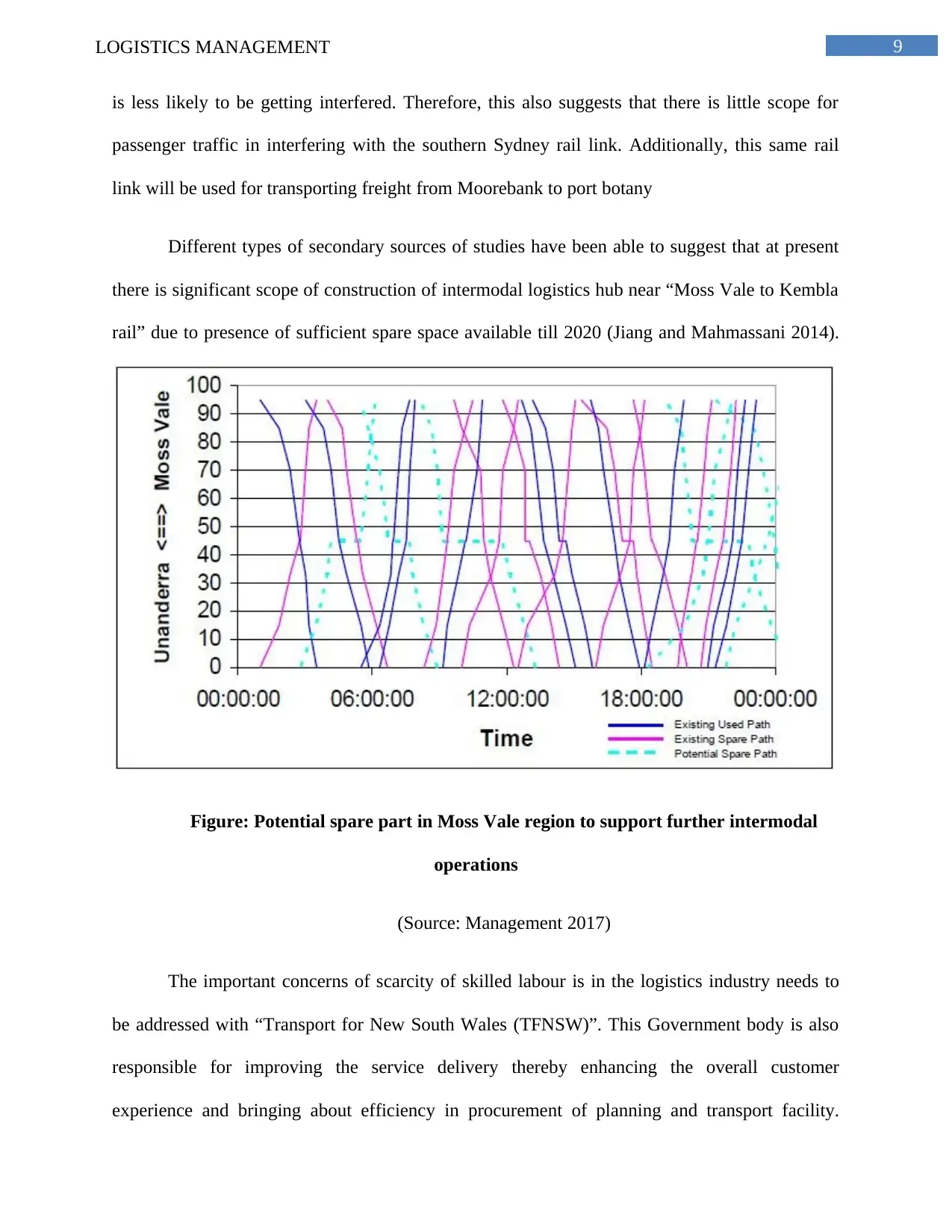
9LOGISTICS MANAGEMENT
is less likely to be getting interfered. Therefore, this also suggests that there is little scope for
passenger traffic in interfering with the southern Sydney rail link. Additionally, this same rail
link will be used for transporting freight from Moorebank to port botany
Different types of secondary sources of studies have been able to suggest that at present
there is significant scope of construction of intermodal logistics hub near “Moss Vale to Kembla
rail” due to presence of sufficient spare space available till 2020 (Jiang and Mahmassani 2014).
Figure: Potential spare part in Moss Vale region to support further intermodal
operations
(Source: Management 2017)
The important concerns of scarcity of skilled labour is in the logistics industry needs to
be addressed with “Transport for New South Wales (TFNSW)”. This Government body is also
responsible for improving the service delivery thereby enhancing the overall customer
experience and bringing about efficiency in procurement of planning and transport facility.
is less likely to be getting interfered. Therefore, this also suggests that there is little scope for
passenger traffic in interfering with the southern Sydney rail link. Additionally, this same rail
link will be used for transporting freight from Moorebank to port botany
Different types of secondary sources of studies have been able to suggest that at present
there is significant scope of construction of intermodal logistics hub near “Moss Vale to Kembla
rail” due to presence of sufficient spare space available till 2020 (Jiang and Mahmassani 2014).
Figure: Potential spare part in Moss Vale region to support further intermodal
operations
(Source: Management 2017)
The important concerns of scarcity of skilled labour is in the logistics industry needs to
be addressed with “Transport for New South Wales (TFNSW)”. This Government body is also
responsible for improving the service delivery thereby enhancing the overall customer
experience and bringing about efficiency in procurement of planning and transport facility.
Secure Best Marks with AI Grader
Need help grading? Try our AI Grader for instant feedback on your assignments.
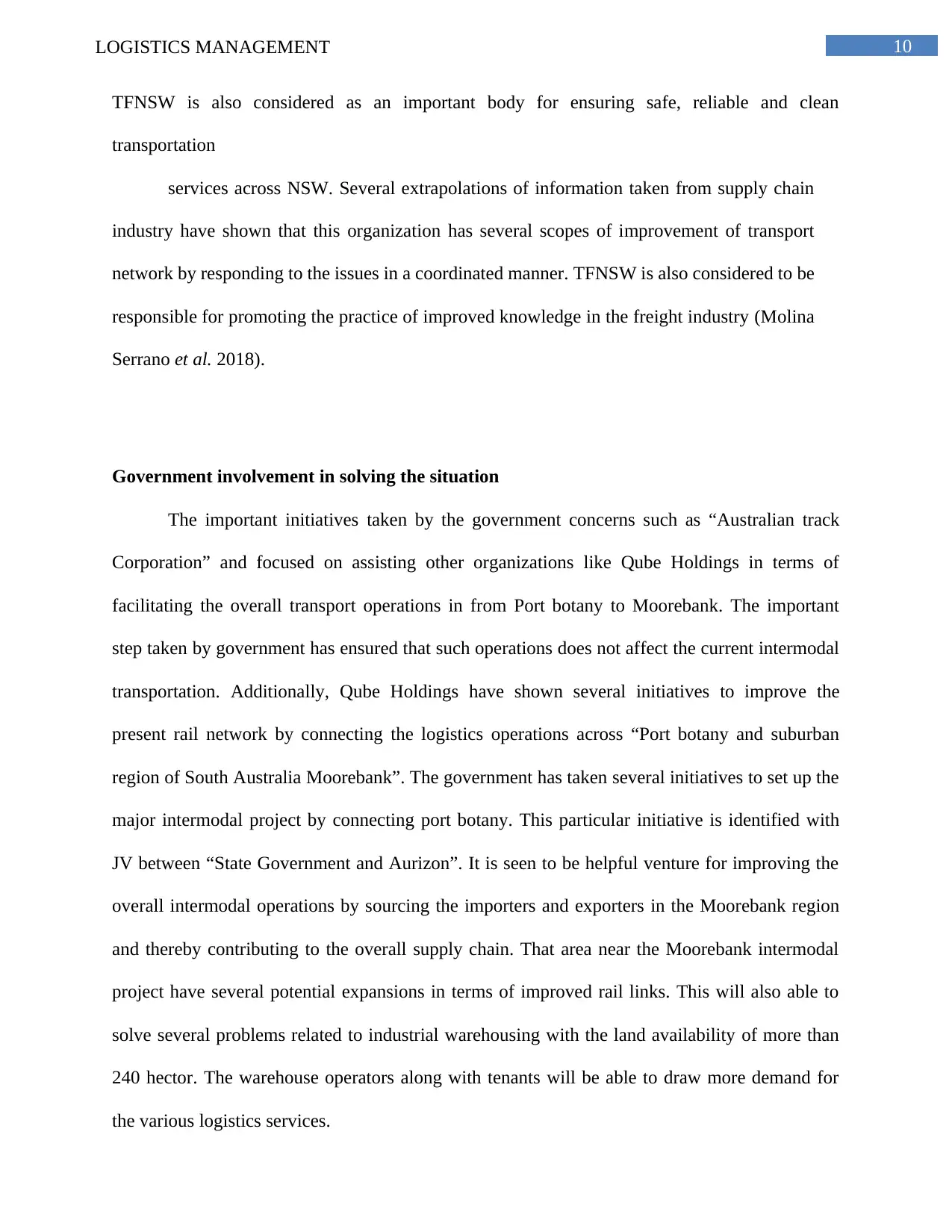
10LOGISTICS MANAGEMENT
TFNSW is also considered as an important body for ensuring safe, reliable and clean
transportation
services across NSW. Several extrapolations of information taken from supply chain
industry have shown that this organization has several scopes of improvement of transport
network by responding to the issues in a coordinated manner. TFNSW is also considered to be
responsible for promoting the practice of improved knowledge in the freight industry (Molina
Serrano et al. 2018).
Government involvement in solving the situation
The important initiatives taken by the government concerns such as “Australian track
Corporation” and focused on assisting other organizations like Qube Holdings in terms of
facilitating the overall transport operations in from Port botany to Moorebank. The important
step taken by government has ensured that such operations does not affect the current intermodal
transportation. Additionally, Qube Holdings have shown several initiatives to improve the
present rail network by connecting the logistics operations across “Port botany and suburban
region of South Australia Moorebank”. The government has taken several initiatives to set up the
major intermodal project by connecting port botany. This particular initiative is identified with
JV between “State Government and Aurizon”. It is seen to be helpful venture for improving the
overall intermodal operations by sourcing the importers and exporters in the Moorebank region
and thereby contributing to the overall supply chain. That area near the Moorebank intermodal
project have several potential expansions in terms of improved rail links. This will also able to
solve several problems related to industrial warehousing with the land availability of more than
240 hector. The warehouse operators along with tenants will be able to draw more demand for
the various logistics services.
TFNSW is also considered as an important body for ensuring safe, reliable and clean
transportation
services across NSW. Several extrapolations of information taken from supply chain
industry have shown that this organization has several scopes of improvement of transport
network by responding to the issues in a coordinated manner. TFNSW is also considered to be
responsible for promoting the practice of improved knowledge in the freight industry (Molina
Serrano et al. 2018).
Government involvement in solving the situation
The important initiatives taken by the government concerns such as “Australian track
Corporation” and focused on assisting other organizations like Qube Holdings in terms of
facilitating the overall transport operations in from Port botany to Moorebank. The important
step taken by government has ensured that such operations does not affect the current intermodal
transportation. Additionally, Qube Holdings have shown several initiatives to improve the
present rail network by connecting the logistics operations across “Port botany and suburban
region of South Australia Moorebank”. The government has taken several initiatives to set up the
major intermodal project by connecting port botany. This particular initiative is identified with
JV between “State Government and Aurizon”. It is seen to be helpful venture for improving the
overall intermodal operations by sourcing the importers and exporters in the Moorebank region
and thereby contributing to the overall supply chain. That area near the Moorebank intermodal
project have several potential expansions in terms of improved rail links. This will also able to
solve several problems related to industrial warehousing with the land availability of more than
240 hector. The warehouse operators along with tenants will be able to draw more demand for
the various logistics services.
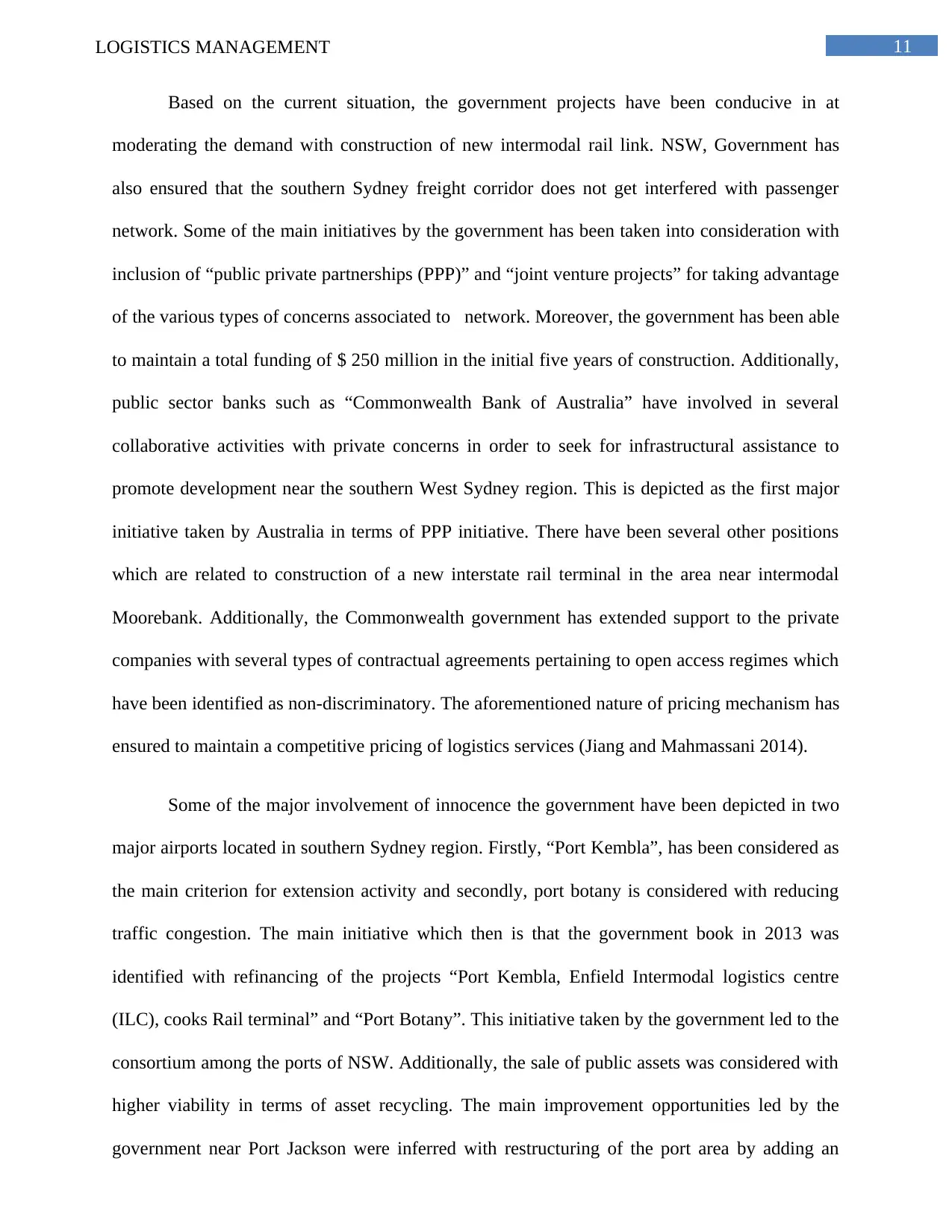
11LOGISTICS MANAGEMENT
Based on the current situation, the government projects have been conducive in at
moderating the demand with construction of new intermodal rail link. NSW, Government has
also ensured that the southern Sydney freight corridor does not get interfered with passenger
network. Some of the main initiatives by the government has been taken into consideration with
inclusion of “public private partnerships (PPP)” and “joint venture projects” for taking advantage
of the various types of concerns associated to network. Moreover, the government has been able
to maintain a total funding of $ 250 million in the initial five years of construction. Additionally,
public sector banks such as “Commonwealth Bank of Australia” have involved in several
collaborative activities with private concerns in order to seek for infrastructural assistance to
promote development near the southern West Sydney region. This is depicted as the first major
initiative taken by Australia in terms of PPP initiative. There have been several other positions
which are related to construction of a new interstate rail terminal in the area near intermodal
Moorebank. Additionally, the Commonwealth government has extended support to the private
companies with several types of contractual agreements pertaining to open access regimes which
have been identified as non-discriminatory. The aforementioned nature of pricing mechanism has
ensured to maintain a competitive pricing of logistics services (Jiang and Mahmassani 2014).
Some of the major involvement of innocence the government have been depicted in two
major airports located in southern Sydney region. Firstly, “Port Kembla”, has been considered as
the main criterion for extension activity and secondly, port botany is considered with reducing
traffic congestion. The main initiative which then is that the government book in 2013 was
identified with refinancing of the projects “Port Kembla, Enfield Intermodal logistics centre
(ILC), cooks Rail terminal” and “Port Botany”. This initiative taken by the government led to the
consortium among the ports of NSW. Additionally, the sale of public assets was considered with
higher viability in terms of asset recycling. The main improvement opportunities led by the
government near Port Jackson were inferred with restructuring of the port area by adding an
Based on the current situation, the government projects have been conducive in at
moderating the demand with construction of new intermodal rail link. NSW, Government has
also ensured that the southern Sydney freight corridor does not get interfered with passenger
network. Some of the main initiatives by the government has been taken into consideration with
inclusion of “public private partnerships (PPP)” and “joint venture projects” for taking advantage
of the various types of concerns associated to network. Moreover, the government has been able
to maintain a total funding of $ 250 million in the initial five years of construction. Additionally,
public sector banks such as “Commonwealth Bank of Australia” have involved in several
collaborative activities with private concerns in order to seek for infrastructural assistance to
promote development near the southern West Sydney region. This is depicted as the first major
initiative taken by Australia in terms of PPP initiative. There have been several other positions
which are related to construction of a new interstate rail terminal in the area near intermodal
Moorebank. Additionally, the Commonwealth government has extended support to the private
companies with several types of contractual agreements pertaining to open access regimes which
have been identified as non-discriminatory. The aforementioned nature of pricing mechanism has
ensured to maintain a competitive pricing of logistics services (Jiang and Mahmassani 2014).
Some of the major involvement of innocence the government have been depicted in two
major airports located in southern Sydney region. Firstly, “Port Kembla”, has been considered as
the main criterion for extension activity and secondly, port botany is considered with reducing
traffic congestion. The main initiative which then is that the government book in 2013 was
identified with refinancing of the projects “Port Kembla, Enfield Intermodal logistics centre
(ILC), cooks Rail terminal” and “Port Botany”. This initiative taken by the government led to the
consortium among the ports of NSW. Additionally, the sale of public assets was considered with
higher viability in terms of asset recycling. The main improvement opportunities led by the
government near Port Jackson were inferred with restructuring of the port area by adding an
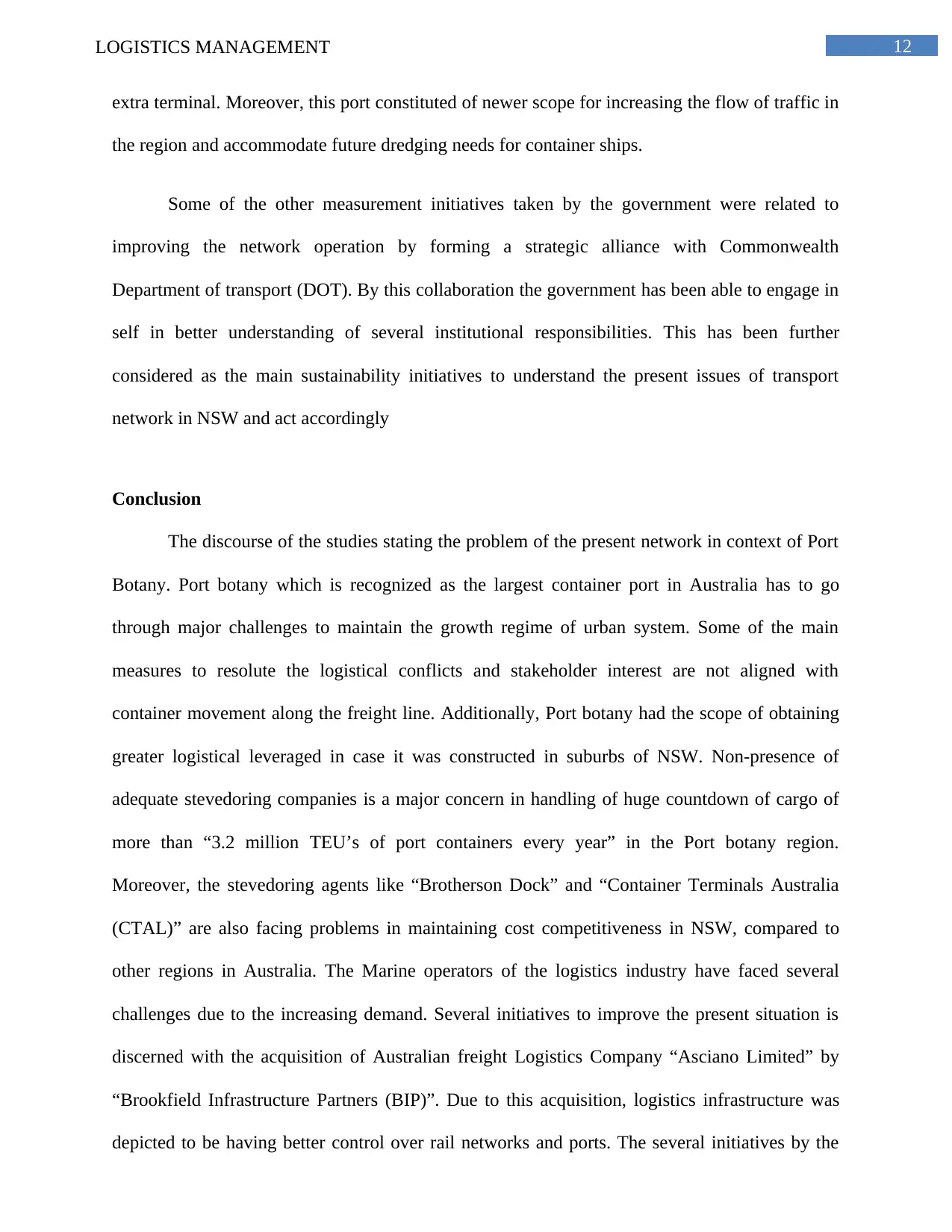
12LOGISTICS MANAGEMENT
extra terminal. Moreover, this port constituted of newer scope for increasing the flow of traffic in
the region and accommodate future dredging needs for container ships.
Some of the other measurement initiatives taken by the government were related to
improving the network operation by forming a strategic alliance with Commonwealth
Department of transport (DOT). By this collaboration the government has been able to engage in
self in better understanding of several institutional responsibilities. This has been further
considered as the main sustainability initiatives to understand the present issues of transport
network in NSW and act accordingly
Conclusion
The discourse of the studies stating the problem of the present network in context of Port
Botany. Port botany which is recognized as the largest container port in Australia has to go
through major challenges to maintain the growth regime of urban system. Some of the main
measures to resolute the logistical conflicts and stakeholder interest are not aligned with
container movement along the freight line. Additionally, Port botany had the scope of obtaining
greater logistical leveraged in case it was constructed in suburbs of NSW. Non-presence of
adequate stevedoring companies is a major concern in handling of huge countdown of cargo of
more than “3.2 million TEU’s of port containers every year” in the Port botany region.
Moreover, the stevedoring agents like “Brotherson Dock” and “Container Terminals Australia
(CTAL)” are also facing problems in maintaining cost competitiveness in NSW, compared to
other regions in Australia. The Marine operators of the logistics industry have faced several
challenges due to the increasing demand. Several initiatives to improve the present situation is
discerned with the acquisition of Australian freight Logistics Company “Asciano Limited” by
“Brookfield Infrastructure Partners (BIP)”. Due to this acquisition, logistics infrastructure was
depicted to be having better control over rail networks and ports. The several initiatives by the
extra terminal. Moreover, this port constituted of newer scope for increasing the flow of traffic in
the region and accommodate future dredging needs for container ships.
Some of the other measurement initiatives taken by the government were related to
improving the network operation by forming a strategic alliance with Commonwealth
Department of transport (DOT). By this collaboration the government has been able to engage in
self in better understanding of several institutional responsibilities. This has been further
considered as the main sustainability initiatives to understand the present issues of transport
network in NSW and act accordingly
Conclusion
The discourse of the studies stating the problem of the present network in context of Port
Botany. Port botany which is recognized as the largest container port in Australia has to go
through major challenges to maintain the growth regime of urban system. Some of the main
measures to resolute the logistical conflicts and stakeholder interest are not aligned with
container movement along the freight line. Additionally, Port botany had the scope of obtaining
greater logistical leveraged in case it was constructed in suburbs of NSW. Non-presence of
adequate stevedoring companies is a major concern in handling of huge countdown of cargo of
more than “3.2 million TEU’s of port containers every year” in the Port botany region.
Moreover, the stevedoring agents like “Brotherson Dock” and “Container Terminals Australia
(CTAL)” are also facing problems in maintaining cost competitiveness in NSW, compared to
other regions in Australia. The Marine operators of the logistics industry have faced several
challenges due to the increasing demand. Several initiatives to improve the present situation is
discerned with the acquisition of Australian freight Logistics Company “Asciano Limited” by
“Brookfield Infrastructure Partners (BIP)”. Due to this acquisition, logistics infrastructure was
depicted to be having better control over rail networks and ports. The several initiatives by the
Paraphrase This Document
Need a fresh take? Get an instant paraphrase of this document with our AI Paraphraser
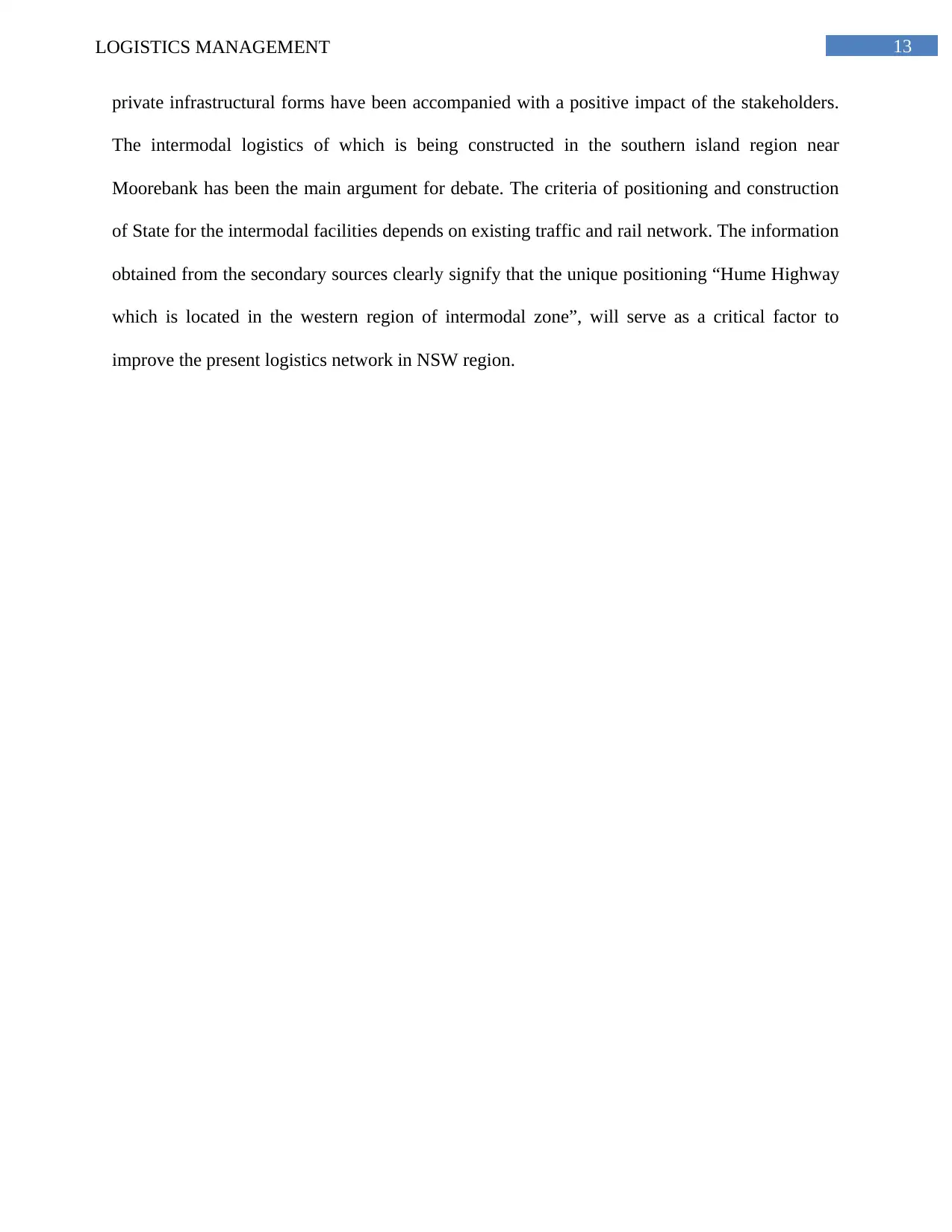
13LOGISTICS MANAGEMENT
private infrastructural forms have been accompanied with a positive impact of the stakeholders.
The intermodal logistics of which is being constructed in the southern island region near
Moorebank has been the main argument for debate. The criteria of positioning and construction
of State for the intermodal facilities depends on existing traffic and rail network. The information
obtained from the secondary sources clearly signify that the unique positioning “Hume Highway
which is located in the western region of intermodal zone”, will serve as a critical factor to
improve the present logistics network in NSW region.
private infrastructural forms have been accompanied with a positive impact of the stakeholders.
The intermodal logistics of which is being constructed in the southern island region near
Moorebank has been the main argument for debate. The criteria of positioning and construction
of State for the intermodal facilities depends on existing traffic and rail network. The information
obtained from the secondary sources clearly signify that the unique positioning “Hume Highway
which is located in the western region of intermodal zone”, will serve as a critical factor to
improve the present logistics network in NSW region.
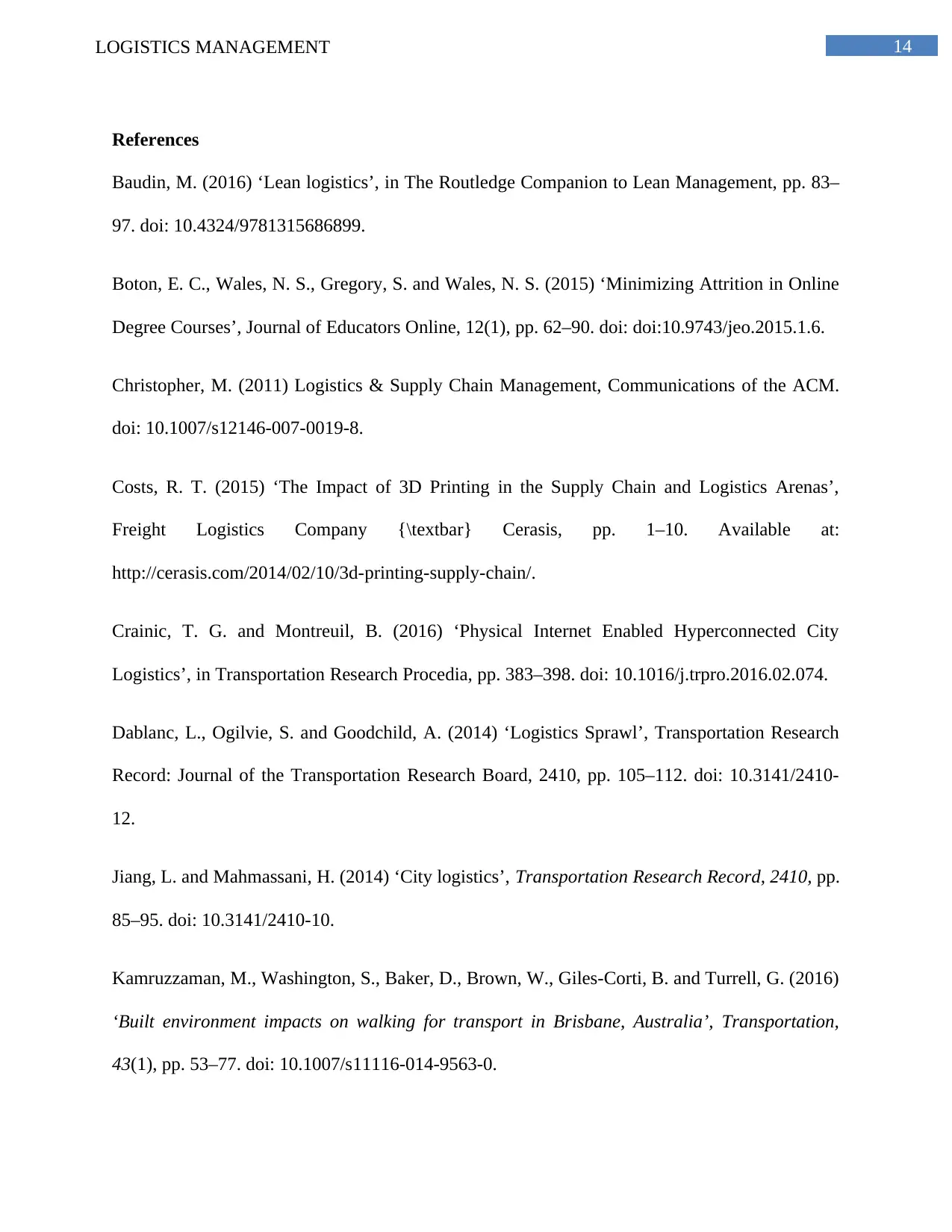
14LOGISTICS MANAGEMENT
References
Baudin, M. (2016) ‘Lean logistics’, in The Routledge Companion to Lean Management, pp. 83–
97. doi: 10.4324/9781315686899.
Boton, E. C., Wales, N. S., Gregory, S. and Wales, N. S. (2015) ‘Minimizing Attrition in Online
Degree Courses’, Journal of Educators Online, 12(1), pp. 62–90. doi: doi:10.9743/jeo.2015.1.6.
Christopher, M. (2011) Logistics & Supply Chain Management, Communications of the ACM.
doi: 10.1007/s12146-007-0019-8.
Costs, R. T. (2015) ‘The Impact of 3D Printing in the Supply Chain and Logistics Arenas’,
Freight Logistics Company {\textbar} Cerasis, pp. 1–10. Available at:
http://cerasis.com/2014/02/10/3d-printing-supply-chain/.
Crainic, T. G. and Montreuil, B. (2016) ‘Physical Internet Enabled Hyperconnected City
Logistics’, in Transportation Research Procedia, pp. 383–398. doi: 10.1016/j.trpro.2016.02.074.
Dablanc, L., Ogilvie, S. and Goodchild, A. (2014) ‘Logistics Sprawl’, Transportation Research
Record: Journal of the Transportation Research Board, 2410, pp. 105–112. doi: 10.3141/2410-
12.
Jiang, L. and Mahmassani, H. (2014) ‘City logistics’, Transportation Research Record, 2410, pp.
85–95. doi: 10.3141/2410-10.
Kamruzzaman, M., Washington, S., Baker, D., Brown, W., Giles-Corti, B. and Turrell, G. (2016)
‘Built environment impacts on walking for transport in Brisbane, Australia’, Transportation,
43(1), pp. 53–77. doi: 10.1007/s11116-014-9563-0.
References
Baudin, M. (2016) ‘Lean logistics’, in The Routledge Companion to Lean Management, pp. 83–
97. doi: 10.4324/9781315686899.
Boton, E. C., Wales, N. S., Gregory, S. and Wales, N. S. (2015) ‘Minimizing Attrition in Online
Degree Courses’, Journal of Educators Online, 12(1), pp. 62–90. doi: doi:10.9743/jeo.2015.1.6.
Christopher, M. (2011) Logistics & Supply Chain Management, Communications of the ACM.
doi: 10.1007/s12146-007-0019-8.
Costs, R. T. (2015) ‘The Impact of 3D Printing in the Supply Chain and Logistics Arenas’,
Freight Logistics Company {\textbar} Cerasis, pp. 1–10. Available at:
http://cerasis.com/2014/02/10/3d-printing-supply-chain/.
Crainic, T. G. and Montreuil, B. (2016) ‘Physical Internet Enabled Hyperconnected City
Logistics’, in Transportation Research Procedia, pp. 383–398. doi: 10.1016/j.trpro.2016.02.074.
Dablanc, L., Ogilvie, S. and Goodchild, A. (2014) ‘Logistics Sprawl’, Transportation Research
Record: Journal of the Transportation Research Board, 2410, pp. 105–112. doi: 10.3141/2410-
12.
Jiang, L. and Mahmassani, H. (2014) ‘City logistics’, Transportation Research Record, 2410, pp.
85–95. doi: 10.3141/2410-10.
Kamruzzaman, M., Washington, S., Baker, D., Brown, W., Giles-Corti, B. and Turrell, G. (2016)
‘Built environment impacts on walking for transport in Brisbane, Australia’, Transportation,
43(1), pp. 53–77. doi: 10.1007/s11116-014-9563-0.
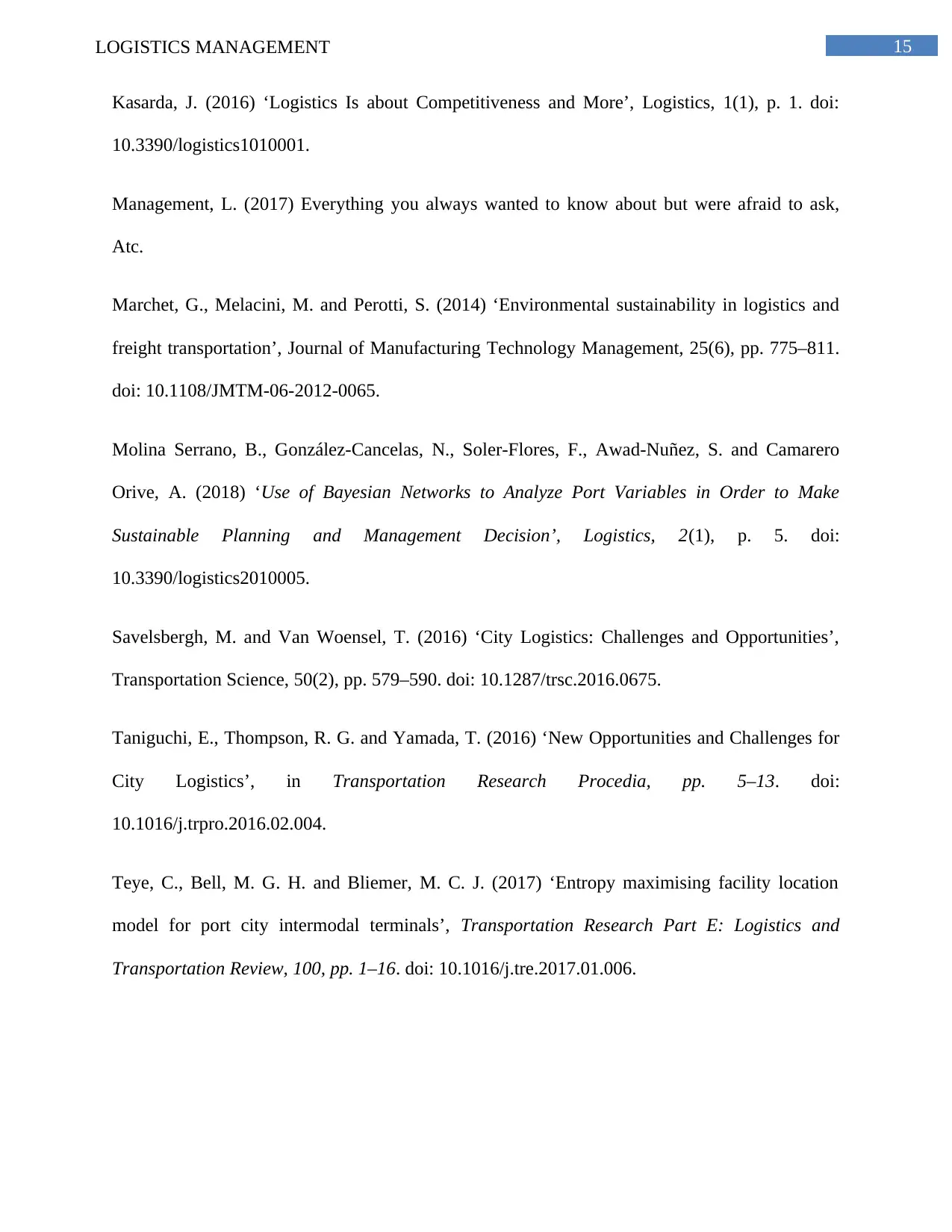
15LOGISTICS MANAGEMENT
Kasarda, J. (2016) ‘Logistics Is about Competitiveness and More’, Logistics, 1(1), p. 1. doi:
10.3390/logistics1010001.
Management, L. (2017) Everything you always wanted to know about but were afraid to ask,
Atc.
Marchet, G., Melacini, M. and Perotti, S. (2014) ‘Environmental sustainability in logistics and
freight transportation’, Journal of Manufacturing Technology Management, 25(6), pp. 775–811.
doi: 10.1108/JMTM-06-2012-0065.
Molina Serrano, B., González-Cancelas, N., Soler-Flores, F., Awad-Nuñez, S. and Camarero
Orive, A. (2018) ‘Use of Bayesian Networks to Analyze Port Variables in Order to Make
Sustainable Planning and Management Decision’, Logistics, 2(1), p. 5. doi:
10.3390/logistics2010005.
Savelsbergh, M. and Van Woensel, T. (2016) ‘City Logistics: Challenges and Opportunities’,
Transportation Science, 50(2), pp. 579–590. doi: 10.1287/trsc.2016.0675.
Taniguchi, E., Thompson, R. G. and Yamada, T. (2016) ‘New Opportunities and Challenges for
City Logistics’, in Transportation Research Procedia, pp. 5–13. doi:
10.1016/j.trpro.2016.02.004.
Teye, C., Bell, M. G. H. and Bliemer, M. C. J. (2017) ‘Entropy maximising facility location
model for port city intermodal terminals’, Transportation Research Part E: Logistics and
Transportation Review, 100, pp. 1–16. doi: 10.1016/j.tre.2017.01.006.
Kasarda, J. (2016) ‘Logistics Is about Competitiveness and More’, Logistics, 1(1), p. 1. doi:
10.3390/logistics1010001.
Management, L. (2017) Everything you always wanted to know about but were afraid to ask,
Atc.
Marchet, G., Melacini, M. and Perotti, S. (2014) ‘Environmental sustainability in logistics and
freight transportation’, Journal of Manufacturing Technology Management, 25(6), pp. 775–811.
doi: 10.1108/JMTM-06-2012-0065.
Molina Serrano, B., González-Cancelas, N., Soler-Flores, F., Awad-Nuñez, S. and Camarero
Orive, A. (2018) ‘Use of Bayesian Networks to Analyze Port Variables in Order to Make
Sustainable Planning and Management Decision’, Logistics, 2(1), p. 5. doi:
10.3390/logistics2010005.
Savelsbergh, M. and Van Woensel, T. (2016) ‘City Logistics: Challenges and Opportunities’,
Transportation Science, 50(2), pp. 579–590. doi: 10.1287/trsc.2016.0675.
Taniguchi, E., Thompson, R. G. and Yamada, T. (2016) ‘New Opportunities and Challenges for
City Logistics’, in Transportation Research Procedia, pp. 5–13. doi:
10.1016/j.trpro.2016.02.004.
Teye, C., Bell, M. G. H. and Bliemer, M. C. J. (2017) ‘Entropy maximising facility location
model for port city intermodal terminals’, Transportation Research Part E: Logistics and
Transportation Review, 100, pp. 1–16. doi: 10.1016/j.tre.2017.01.006.
1 out of 16
Related Documents
Your All-in-One AI-Powered Toolkit for Academic Success.
+13062052269
info@desklib.com
Available 24*7 on WhatsApp / Email
![[object Object]](/_next/static/media/star-bottom.7253800d.svg)
Unlock your academic potential
© 2024 | Zucol Services PVT LTD | All rights reserved.



